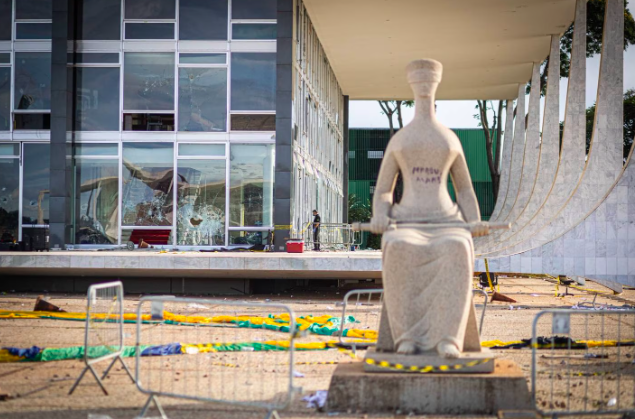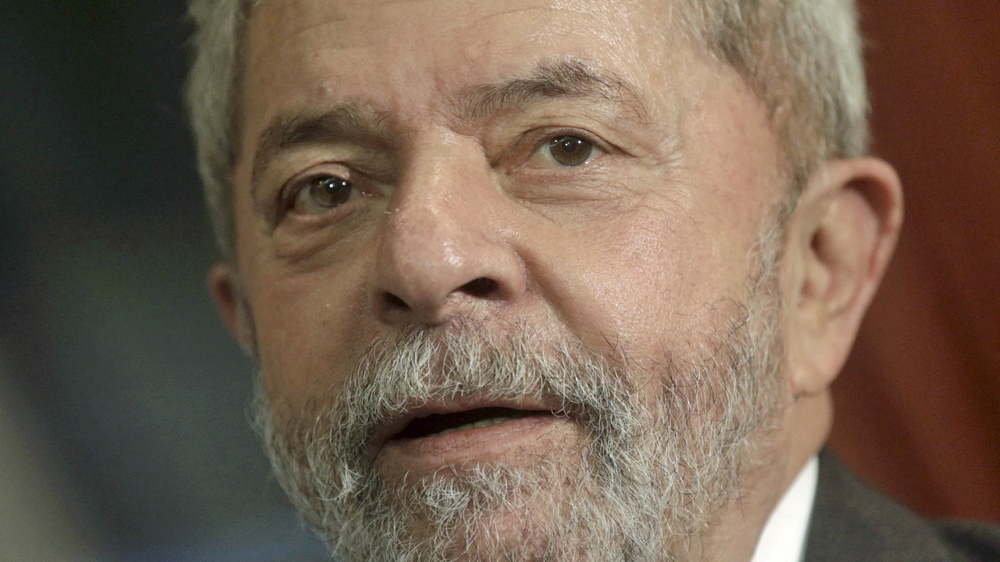By Simone Preissler Iglesias*
(Opinion) Late in the afternoon of January 8, Luiz Inácio Lula da Silva looked out over the devastated Brazilian capital from the third-floor balcony of the presidential palace and reflected on how his presidency had been upended.
The leader, universally known as Lula, had spent hours wading through piles of overturned desks across floors sullied by rioters and among the wreckage of what were once priceless historical artifacts.
Grim and silent, it was now that he realized the magnitude of the challenge he faced, according to a close ally who spoke to the president about that day’s events in Brasília.

After his campaign focused on unifying Brazil, a hopeful message that helped secure his narrow victory over Jair Bolsonaro in October, Lula was confronted with how divided the nation of more than 215 million had become since he last governed.
His conclusion, this person said, was that instead of seeking unity, he would have to go all out to win over his opponents to ensure that his third term and his political ambitions were not derailed.
Barely a week after his inauguration, Lula realized that this decision would set the course for his government and pave the way for confrontation to dominate his last term at the helm of Latin America’s largest economy.
It is a path that has already provoked friction with the central bank and threatens to paralyze his reform program, with political volatility as a substitute for compromise at the very moment the economy slows.
“Lula won one of the most difficult elections in Brazil’s recent history, inherited a divided country, and, soon after, faced a coup organized to undermine our democracy,” said Congressman Eunicio Oliveira, a longtime ally who was a minister in his first term and head of the Senate.
According to Oliveira, Lula can still achieve his goals, and he believes the president has the experience, political capital, and credibility “to get Brazil back on track.”
But all the obstacles put in his way “made the beginning of his government more challenging,” he said.
Talking with about 20 people close to Lula, including current and former ministers, congressmen, presidential aides, and officials from various ministries, show a president changed by the events of January 8, when Bolsonaro supporters rampaged through the Three Powers square in Brasília, home to Congress, the Supreme Court and Brazil’s presidential palace.
The Lula that emerged is more combative than conciliatory, according to the people, who asked not to be named to discuss the president’s thinking more freely.
He is willing to take on anyone if he believes it threatens his last chance to rebuild a Brazil that resembles the one he left at the end of his second term in 2010, with a robust economy, a declining poverty rate, and a personal approval rating above 85%.
The president has declined repeated requests for an interview with Bloomberg News.
“I know I will carry this outrage with me for the rest of my life,” Lula told the Supreme Court on February 1, referring to the “violence and hatred” of three weeks earlier.
The paradox for Lula is that his adoption of a confrontational political style mirrors the approach of Bolsonaro, the far-right populist who became president and governed by stoking polarization.
With Bolsonaro returning from self-imposed exile to take the reins as opposition leader and firebrand-in-chief, the result threatens ever-deepening rifts in Brazil.
The question is how the cycle of distrust can be broken.
For Lula, “there is no grace period; it’s a constant war,” said Bruna Santos, director of the Brazil Institute at the Wilson Center in Washington.
“And the warrior is under a lot of stress because he faces many battles.”
So far, his main target hasn’t been Bolsonaro, who left for Florida in December and only returned three months later, but Roberto Campos Neto, the central bank chief whose decision to keep Brazil’s benchmark interest rate at its highest level in six years has drawn Lula’s rage.
The possibility of tight monetary policy acting as a drag on growth has irritated a leader with too much ambition and too little time.

Lula wants to eradicate the extreme hunger that returned to Brazil during the pandemic, reverse the destruction of the Amazon rainforest that took place under his predecessor, and reclaim an important role for his country on the world stage – he was just in China after visiting the US – and strengthen its democratic institutions.
But the slowing economy undermines his ability to influence those outcomes, especially at a time when he lacks fiscal room to accommodate large investments and faces a divided Congress and a powerful opposition eager to see him fail.
Friction with the central bank governor “is counterproductive,” as it fuels inflation expectations and makes it harder for the bank to cut rates, said Adriana Dupita of Bloomberg Economics.
“Lula’s third term already has its own challenges: the underlying growth trend is weaker than in 2003-2010, fiscal space is tighter than before, and the political divide is harder to overcome even for a skilled negotiator like him,” the São Paulo-based economist said.
However, the long shadow of the attempted insurrection has weighed on that reputation for dialogue and increased pressure.
It almost forced a confrontation with Bolsonaro’s supporters and Brazil’s military, which was closely aligned with the former president and bore at least some responsibility for allowing the unrest to take place in the eyes of Lula and his allies.
There are signs that the pressure is taking its toll on the leftist leader.
His public fights against financial markets, central bank autonomy, and other lawmakers have begun to alienate some of the moderates who supported him during the election.
Even some of his supporters find his continued escalations disconcerting.
Brazil certainly changed in the 13 years between his presidencies, a period during which a commodities boom turned to bust and the economy collapsed, a massive corruption scandal ensnared hundreds of politicians and business leaders, a president was impeached, and Lula spent time in jail – all of which helped Bolsonaro usher in a raw new political era.
But Lula has also changed, say his allies.
He has become more impatient and less available, very different from the leader who used to listen to opposing views before making up his mind.
He considers that he has seen and done it all and now has fairly clear ideas about what should and should not be done.
Politicians who worked with Lula in the past and still maintain personal or professional ties with the president give him the benefit of the doubt.
They say he is the country’s most experienced leader, but in recent years he has faced a series of losses – his wife of more than four decades, a brother, a grandson, and, not least, his freedom – so it is natural for him to be more bitter.
But even setting aside any effort to unite Brazil, a goal that seems increasingly far-fetched, the early days of his government suggest that his much-vaunted turn to the center was just an electoral strategy.
His poor-versus-rich rhetoric when discussing financial markets contributed to a toxic relationship entirely different from his first term when he worked for an alliance with investors.
One result is that Lula’s administration looks more like a traditional Workers’ Party government than one representing the broader coalition that brought him to power.
Lula centralizes all key decisions and, as a result, is much more isolated.
Whereas he used to delegate, now few, if any, of his closest advisors can or will question him.
Lula’s closest aides have no previous experience at the top, except for Alexandre Padilha, Minister of Institutional Relations, the same position he held during Lula’s second term.
Consequently, Lula’s third term does not look like the continuation of a successful project but rather a work in progress.
His relationship with Congress remains unknown. His opposition in the upper and lower houses is greater and more vociferous than in the past.
A new element is Janja Lula da Silva, Brazil’s first lady, whom he married last year.
Her ascendancy alienates former allies, especially congress members, who complain about lack of access to the president.
Above all, Lula feels strengthened by his historic comeback.
After defeating the Lava Jato investigation and emerging from jail to win another presidential term, and facing an insurrection, Lula sometimes behaves as if there is nothing he cannot accomplish.
However, the memory of the riots is like a ghost constantly reminding him that he does not have much time to achieve everything he wants.
Lula repeats at every ministerial meeting that he is in a hurry.
At 77, he has perhaps just under four years to fulfill his promise to return Brazilians to the bonanza they enjoyed during his first two terms in office and, in the process, save his legacy, tarnished by corruption allegations and a prison sentence.
“Brazilian democracy came out of these elections very damaged, especially after January 8,” said Santos of the Wilson Center.
“The institutions are still there, and democracy won in the end. But Lula still has a lot on his plate – and his challenge now is delivery.”
*With contributions from Bryan Travis Waldron
With information from Bloomberg

